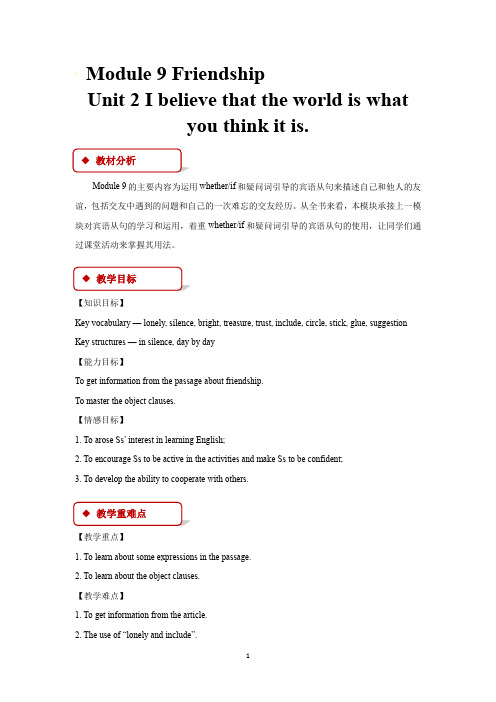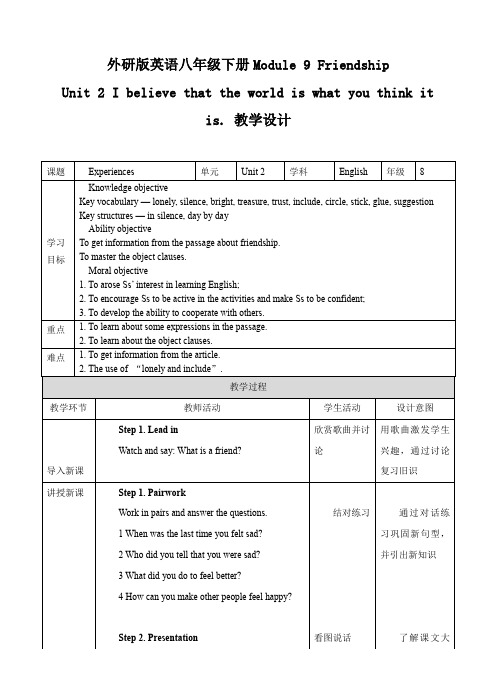2017-2018学年外研版初中八年级英语下全册精品教案Module 9 Friendship
- 格式:doc
- 大小:130.65 KB
- 文档页数:18

教学基本信息课题Module9Friendship Unit2I believe that the world is what you think it is.教材义务教育教科书《英语》八年级下册(外语教学与研究出版社)姓名学科英语学校班级八年级时间课型读说课指导思想与理论依据《义务教育英语课程标准(2011年版)》指出英语课程具有工具性和人文性双重性质,即英语课程要培养学生基本英语核心素养,同时提高学生综合人文素养。
教师在教学中理解并践行基于核心素养的这一课程理念,需要通过课堂中的每一项具体的教学活动来实现培养学生语言能力,文化品格,学习能力和思维品质的目标,发挥英语学科的育人价值。
英语阅读教学不仅仅要帮助学生获取语言知识和技能,更要引导学生对文本进行深层次的探究解读,激活学生的高阶思维,实现语言综合运用和创新能力。
在阅读过程中,学生在理解与表达的语言实践活动中,通过感知、预测、获取、分析、概括、比较、评价、创新等思维活动,建构结构化知识,在分析问题和解决问题的过程中,发展思维品质,形成文化理解,学会学习,促进英语学科素养的形成与发展,塑造正确的人生观和价值观。
义务教育阶段英语课程的主要目的是为学生发展综合语言运用能力打好基础。
初二学段参考《课程标准》中四级目标阅读技能要求:四级目标阅读技能要求:1.能连贯、流畅地朗读课文。
2.能理解简易读物中的事件发生顺序和人物行为。
3.能从简单的文章中找出有关信息,理解大意。
4.能根据上下文猜测生词的意思。
5.能理解并解释图表提供的信息。
6.能读懂简单的个人信件、说明文等应用文体材料。
7.能使用英汉词典等工具书帮助阅读理解。
8.课外阅读量应累计达到10万词以上。
本单元阅读课聚焦前四个技能目标要求展开设计。
教学背景分析教学内容分析:话题:本课为第九模块第二单元,模块话题是友谊(Friendship)。
本单元话题是《课程标准》的第二个话题家庭、朋友与周围的人(Family,friends and people around)中的第7小项朋友(Friends)和第4个话题日常活动(Daily life)第14个小项学校生活(School life)0与本话题相关的内容在七年级下册My past life Unit II was bom in a small village和九年级上册M6Problems Unit2If you tell him the truth now,you will show that you are honest.中有涉及。

外研版八年级英语下册《Module 9 Friendship Unit 2》第一课时说课稿一. 教材分析外研版八年级英语下册《Module 9 Friendship Unit 2》第一课时,主要讲述了关于友谊的一些话题。
通过本节课的学习,学生能够了解到友谊的重要性,以及如何去维护和发展友谊。
教材中涉及到了一些日常交际用语,让学生能够在实际生活中运用英语进行交流。
同时,本节课还要求学生能够听、说、读、写关于友谊的词汇和句子,提高他们的英语综合运用能力。
二. 学情分析八年级的学生已经具备了一定的英语基础,对于日常的英语交流已经没有太大的问题。
但是,他们在英语写作和阅读方面还存在一定的困难,特别是对于一些复杂的句子结构和词汇的运用。
因此,在教学过程中,我们需要注重培养学生的阅读和写作能力,让他们能够在实际生活中运用英语进行交流。
三. 说教学目标1.知识目标:学生能够掌握关于友谊的词汇和句子,了解友谊的重要性。
2.能力目标:学生能够听、说、读、写关于友谊的词汇和句子,提高他们的英语综合运用能力。
3.情感目标:学生能够认识到友谊的重要性,学会去珍惜和维护友谊。
四. 说教学重难点1.重点:学生能够掌握关于友谊的词汇和句子。
2.难点:学生能够运用所学的词汇和句子进行实际的交流和写作。
五. 说教学方法与手段1.教学方法:采用任务型教学法,让学生在实际的任务中运用英语进行交流。
2.教学手段:利用多媒体教学,播放音频和视频材料,让学生能够更好地理解和运用所学的知识。
六. 说教学过程1.引入:通过一个关于友谊的短剧,引出本节课的主题,激发学生的学习兴趣。
2.呈现:展示本节课的主要词汇和句子,让学生进行观察和理解。
3.操练:通过一些小组活动,让学生在实际的语言环境中进行交流和运用。
4.练习:通过一些听力、口语、阅读和写作的练习,让学生巩固所学的知识。
5.巩固:通过一些游戏和活动,让学生在轻松的氛围中复习和巩固所学的知识。

Module 9 FriendshipUnit 2 I believe that the world is whatyou think it is.Module 9的主要内容为运用whether/if 和疑问词引导的宾语从句来描述自己和他人的友谊,包括交友中遇到的问题和自己的一次难忘的交友经历。
从全书来看,本模块承接上一模块对宾语从句的学习和运用,着重whether/if 和疑问词引导的宾语从句的使用,让同学们通过课堂活动来掌握其用法。
【知识目标】Key vocabulary — lonely, silence, bright, treasure, trust, include, circle, stick, glue, suggestion Key structures — in silence, day by day【能力目标】To get information from the passage about friendship.To master the object clauses.【情感目标】1. To arose Ss’ inter est in learning English;2. To encourage Ss to be active in the activities and make Ss to be confident;3. To develop the ability to cooperate with others.【教学重点】1. To learn about some expressions in the passage.2. To learn about the object clauses.【教学难点】1. To get information from the article.2. The use of “lonely and include”.PPT课件、录音机、课堂练习Step 1 Leading-inLook at the pictures and answer the questions.S tep 2 Consolidate new wordsLook and say. The teachers shows the pictures of new words and let the students to say as soon as possible.Step 3 Pre-readingWork in pairs and answer the four questions.1) When was the last time you feel sad?2) Who did you tell that you were sad?3) What did you do to feel better?4) How can you make other people feel happy?Step 4 ListeningListen to Part 2 and answer the questions.1.How old was she when she went to a new school?2.What changed her life?Step 5 Reading1.Read the passage and answer the questions.Does the beginning of the passage surprise you? Why?Yes, it does. Because I don’t think a smile can be an important gift.1)How did the writer feel in the past?She felt very lonely.2)How does the writer feel now?She feels happy now.3)What advice does she give?Smile at the world and it will smile back.2. Find out the object clauses in the passage.1) I didn’t know who she was.2) One day, I asked her why she smiled at me that day.3) She said she could not remember!4) Now I believe that the world is what you think it is.3. Complete the sentences.Step 6 Learning to learnTo learn about the wh-questions while reading.When you read a story, focus on thefive wh-questions:•Who is the main character?•What happens?•When does the main event or story take place?•Where does it take place?•Why?Step 7 Complete the sentences with the words in the box1.Read the sentences carefully.a)My father made the _________ that I should find a hobby.b)E ven today, some people search for _________ under the sea.c)You can _______ them to look after the house.d)Y ou must make the stamp wet before you ______ it to the letter.e)Have you got any _______? I want to stick these pieces of paper together.f)John’s _______ of friends includes some students from the UK.g)I like the _______ in the countryside. The city is too noisy for me!2.Choose the right words to fill in the blanks.Step 8 Language pointsTo learn about the main points in the passage.1. Every time I heard the other students talking and laughing, I felt even more lonely.every time, 表示“每次”。


外研版八年级英语下册《Module 9 Friendship Unit 2》第二课时说课稿一. 教材分析《Module 9 Friendship Unit 2》是外研版八年级英语下册的一单元,本节课的主要内容是关于友谊的。
通过阅读一个关于朋友之间互相帮助的故事,学生可以提高他们的阅读理解能力,并学习到友谊的重要性。
教材还提供了许多练习题,帮助学生巩固所学知识,提高他们的语言运用能力。
二. 学情分析八年级的学生已经具备了一定的英语基础,能够理解和运用一些基本的英语知识。
然而,他们在阅读理解,尤其是对于长篇阅读材料的理解上还存在一定的困难。
此外,学生在语言运用方面,尤其是口语表达和写作能力方面还需要进一步提高。
三. 说教学目标1.知识目标:学生能够理解并运用本节课所学的单词和短语,如“friendly”、“kindness”等。
2.能力目标:学生能够阅读并理解长篇阅读材料,提高他们的阅读理解能力。
3.情感目标:学生能够理解友谊的重要性,学会珍惜和维护友谊。
四. 说教学重难点1.重点:学生能够掌握本节课所学的单词和短语,并能够运用到实际情境中。
2.难点:学生能够理解并运用文章中的长句和复杂句型。
五. 说教学方法与手段在本节课中,我将采用任务型教学法,让学生在完成任务的过程中,提高他们的阅读理解能力和语言运用能力。
此外,我还将运用多媒体教学手段,如PPT等,为学生提供丰富的教学资源,帮助他们更好地理解和掌握所学知识。
六. 说教学过程1.导入:通过展示一些关于友谊的图片,引导学生谈论友谊的重要性,激发他们的学习兴趣。
2.阅读理解:让学生阅读一篇关于朋友之间互相帮助的故事,要求他们回答一些问题,以检验他们对文章的理解。
3.新课教学:引导学生学习本节课的新单词和短语,并通过例句和练习帮助他们掌握这些词汇的用法。
4.课堂练习:让学生完成一些练习题,以巩固他们所学的新知识。
5.小组讨论:让学生分组讨论,分享他们对友谊的理解和经历,培养他们的口语表达能力。

外研版八年级下册英语(新)《Module 9 Friendship Unit 2》说课稿4一. 教材分析《Module 9 Friendship Unit 2》是人教版八年级下册英语教材的一部分,本节课的主要内容是关于友谊的重要性以及如何维护友谊。
通过本节课的学习,学生能够了解到友谊的力量,学会如何与他人建立良好的关系,并能够运用所学知识进行实际交流。
二. 学情分析八年级的学生已经具备了一定的英语基础,对于日常的交流和表达已经没有太大的问题。
但是,他们在阅读理解,尤其是对于长篇阅读的理解上还有一定的困难。
此外,学生对于友谊的理解可能还不够深入,需要通过本节课的学习来进一步加深。
三. 说教学目标1.知识目标:学生能够掌握本节课的重点单词和短语,并能够熟练运用。
2.能力目标:学生能够通过阅读理解文章,提高自己的阅读能力。
3.情感目标:学生能够理解友谊的重要性,学会珍惜和维护友谊。
四. 说教学重难点1.重点:本节课的重点是让学生能够掌握并运用重点单词和短语。
2.难点:对于部分学生来说,阅读理解可能是一个难点,需要通过教师的引导和帮助来克服。
五. 说教学方法与手段1.教学方法:采用任务型教学法,让学生在完成任务的过程中学习和运用知识。
2.教学手段:利用多媒体课件和网络资源,增加课堂的趣味性和互动性。
六. 说教学过程1.导入:通过展示一些关于友谊的图片,引导学生思考友谊的重要性。
2.读前活动:让学生预览文章标题和段落标题,对文章内容进行预测。
3.阅读活动:学生自主阅读文章,回答相关问题。
教师引导学生进行讨论和交流。
4.读后活动:学生进行小组讨论,分享自己的友谊故事,并互相提出建议。
5.总结:教师对学生的讨论和分享进行总结,强调友谊的重要性。
七. 说板书设计板书设计主要包括本节课的重点单词和短语,以及教师对于友谊的理解和重要性的阐述。
八. 说教学评价教学评价主要通过学生的课堂参与度,阅读理解能力和情感态度来进行。
外研版 Module9 教与学导教案M9 Friendship U1 Could I ask if you’ ve mentioned this to her?【学目】1、(知与技术): helpline, separate, explain, mention, refuse, treat, herself, whether, lonely, regret, patient, introduce, encourage短: get separated, mention sth. to sb., refuse to do sth., regret doing sth., encourage sb. to do sth., join in.2、(程与方法)小之,成之合作,任,形成快乐的学氛3、(感情、度与价)能听懂和对于介交友中碰到的言资料,能从文中掌握怎样理【要点点】交友中碰到的和困。
1.The object clauses2.引: if 和 whether 及疑【教课程】第一:step1 warm-up ,引出step2 达成教案的自主学,达,基关,小比 step3 后小合作达成法知第二:step1 听的,达成activity1,2step 2 听和熟,达成activity3,4step3 解法要点,生达成反step4 提高导学过程【目学】T: Have you got any good friends?Ss:.T: How long have you been friends? Do you have any problems between you?Ss:.【自主学,基关】Task 1: New words, phrases and sentences.1. I can read.helpline, separate, explain, mention, refuse, treat, herself, whether, lonely, regret, patient, introduce, encourage2. I can write.1).使分开,分开句子 (文中 ) .2).解,明句子 (文中 ) .3).说起,明句子 (文中 ) .4).拒句子 (文中 ) .5).后悔,憾句子 (文中 ) .6).有耐心的句子 (文中 ) .7).鼓舞,激励句子 (文中 ) .8).参加句子 (文中 ) .9).能否同音10). 孤单的,孤独的同(辨析?)3. I can match.() get separated a.与某人交朋友() mention sth. to sb. b.拒去做某事() refuse to do sth. c.分开,分开() regret doing sth. d.向某人起某事() encourage sb. to do sth. e.憾做了某事() join in. f. 加入,参加() treat sb. like that g. ⋯⋯有耐心() feel lonely h.鼓舞某人去做某事() introduce ⋯ to sb. i.向那待某人() be patient with j.感觉孤单() make friends with sb. k.向某人介方法导引学习行为提示师生互动引入本课话题:好朋友之间出现的问题。
1 2017-2018学年外研版初中八年级英语下全册精品教案 Module 9 Friendship 【教材分析】 Module 9的主要内容为运用whether/if和疑问词引导的宾语从句来描述自己和他人的友谊,包括交友中遇到的问题和自己的一次难忘的交友经历。从全书来看,本模块承接上一模块对宾语从句的学习和运用,着重whether/if和疑问词引导的宾语从句的使用,让同学们通过课堂活动来掌握其用法。 Unit 1 Could I ask if you’ve mentioned this to her? 【教学目标】 Knowledge objective 1. Words: helpline, separate, explain, mention, refuse, treat, herself, whether, regret, patient, introduce, encourage 2. Expressions: join in, encourage sb. to do sth., refuse to do sth., regret doing sth., mention sth. to sb., get separate 3. Grammar: the object clause Ability objective 能听懂和阅读关于介绍交友中遇到问题的语言材料,能从课文中掌握如何处理交友中遇到的问题和困难;能编写有关交友中遇到问题的对话。 Moral objective 1. To arise Ss‟ interest in learning English; 2. To encourage Ss to be active in the activities and make Ss to be confident; 3. To develop the ability to cooperate with others. 【教学重点】 The object clauses 【教学难点】 1. The object clauses 2. if和whether的区别。 【教学方法】 PWP method, task-based method and interactive approach 【教学手段】 2
A tape recorder, multimedia and some pictures 【教学过程】 Teaching Procedures: Step 1 Presentation Look and say. The teacher shows the pictures of new words and let the students to say as soon as possible. Step 2 Warming up Ss look the pictures and answer the questions. Step 3 Listening 1. Listen to Part 1 and choose the correct answer. 1) Linging wants to speak to Betty / Mrs King. 2) Betty is in / out. 3) Betty’s friend / Mrs King’s friend works on the Friendship Helpline. Answers: Betty, out, Mrs King‟s friend 2. Number the sentences in the order you hear them. a) I‟m sorry, she‟s not in at the moment. b) Is that Mrs. King? c) Could I speak to Betty, please? d) May I have the number? e) Can I take a message? f) Thanks so much. Answers: a-2, b-3, c-1, d-5, e-4, f-6 3. Now listen again and check. Step 4 Reading 1. Listen to Part 3 and answer the following questions. 1) Who has the problem? Linging. 2) What‟s her problem? … 2. Now check the true sentences. 1) Linging called to ask for advice about her schoolwork. 2) Linging and her best friend are now in the same school. 3) Linging is happy to see her best friend at the same school. 3
4) Linging is having a hard time in the new school. 5) Linging gets help from the helpline. Answers: 2, 3, 5 3. Complete the passage with the correct form of the words in the box Read the passage carefully. Then use the correct form of the words to fill in the blanks. encourage herself introduce lonely patient regret separate treat When you get (1)_________ from a friend, it may create problems you‟re your friendship. She may not want you to see your other friends, if this is the case, she probably (2)_______ you like that because she does not feel sure of (3)________. Try to find out whether she feels (4)_______ without you. It is natural to feel like that. She probably (5)________ hurting you. Be (6)________ with her, (7)_________ her to your other friends and (8)___________ her to join in more. Answers: separated, treats, herself, lonely, regrets, patient, introduce, encourage Step 5 Everyday English Let Ss say the everyday English that they have learnt in the passage. 电话用语: Who‟s calling, please? This is … speaking. Step 6 Pronunciation and speaking Listen and underline the words the speaker stresses. Don‟t tell me who she is. Tell me when the problem started. Can you tell me how she‟s different? Maybe she doesn‟t feel very sure of herself in her new school. I‟ll encourage her to join in more. Now listen again and repeat. Step 7 Language points Ss should master the main points from the passage in Part 3. If possible, let the students to say at first. 1. We got separated when we went to different schools last term, but we stayed in touch. get separated 表示“分开,分隔”。 4
e.g. We got separated when we were young. 我们小时候就分开了。 2. So could you explain what happened then? explain v. 解释;说明 explain sth. to sb. 向某人解释某事 e.g. Can you explain the rules of the game? 你能说明一下游戏规则吗? I‟ll explain the problem to you. 我会向你解释这个问题。 3. Could I ask if you‟ve mentioned this to her? mention sth. to sb. 表示“向某人说起某事”。 e.g. I mentioned this idea to my mum, and she seemed to like it. 我把这个想法跟妈妈说了,她好像挺喜欢的。 4. But she refused to listen. refuse to do sth.表示“拒绝去做某事”。 e.g. I refused to buy those things. 我拒绝买那些东西。 5. Do you know why she treats you like that? treat sb. like that 表示“向那样对待某人”。 e.g. He treated me like that when I was in trouble. 当我遇到麻烦时,他那样对我。 6. Maybe she doesn‟t feel very sure of herself in her new school. herself 表示“她自己”。是反身代词。 e.g. She can look after herself. 她可以照顾她自己。 7. Try to find out whether she feels lonely without you. whether 表示“是否”,相当于 if。feel lonely 表示“感到孤独”。 e.g. He asked me whether she was coming. 他问我她是否来。 a lonely house in the country 乡下一间孤零零的房子 8. I‟m sure she regrets hurting you. regret 表示“懊悔,遗憾”。 regret doing sth. 表示“遗憾做了某事”。 e.g. I regret disturbing you when you study in class. 我很懊悔在你学习的时候打扰你。 9. Try to introduce her to them.